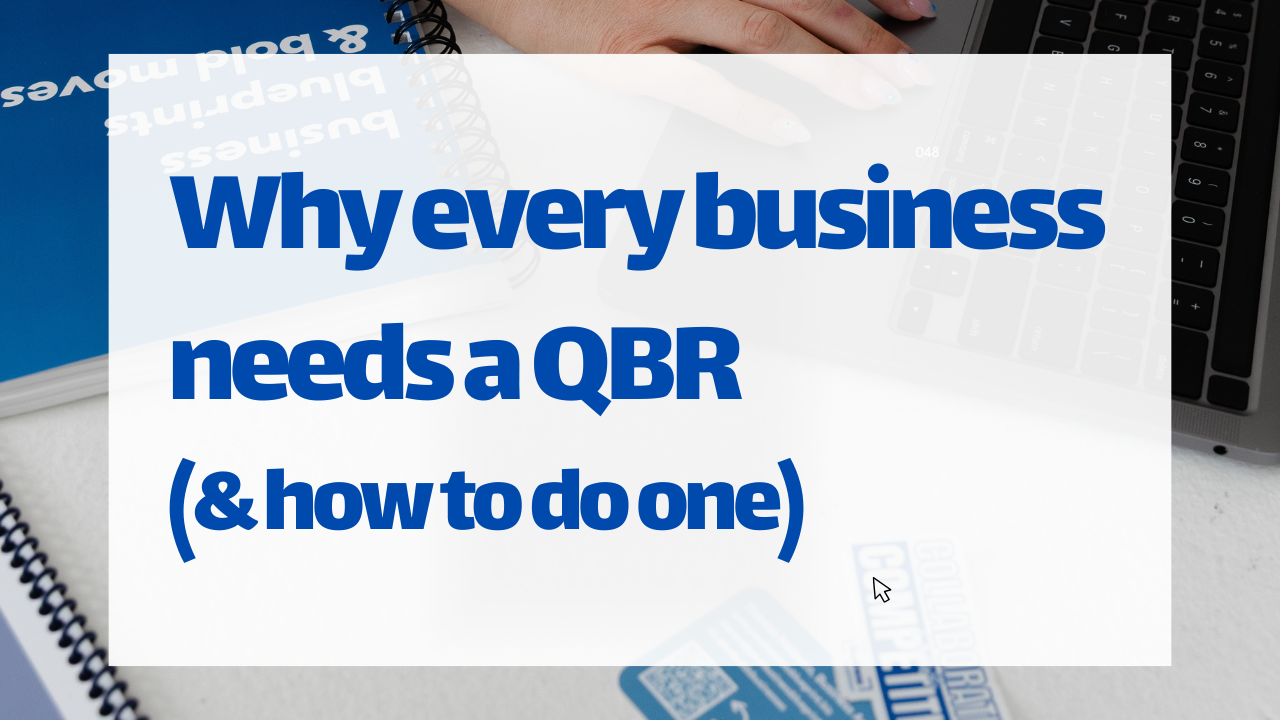October 9, 2025
By Theresa Mazzuco, Business Strategist for New & Early Stage Businesses

On the first Monday of very quarter, I block off a few hours in the afternoon for what I call my Quarterly Business Review — or as I like to think of it, my CEO reset.
No meetings. No distractions. Just me, my business, and a big cup of coffee (or 3).
It’s my time to step back and take an honest look at what’s actually happening inside my business — what’s working, what’s not, and where I’m headed next.
As a business coach, I help other entrepreneurs do the same thing: slow down long enough to see the big picture. Because if we’re being honest, most of us spend so much time working in our business that we forget to work on it.
And this simple two-hour ritual has completely changed how I lead, plan, and grow.

When I started Your Business Blueprint, at the timeI was working in marketing and event strategy for a cybersecurity company in the MSP (managed service provider) space.
If you’re not familiar, MSPs are essentially outsourced IT departments for small and midsize businesses — they’re the people who keep everything running behind the scenes. They manage networks, protect data, and handle cybersecurity so their clients can focus on running their business.
The interesting thing is, when an MSP is doing their job really well, everything is quiet. No outages. No emergencies. Which is great for the client — but it also means the MSP’s value can be easy to overlook.
That’s why we used to recommend our MSP clients hold Quarterly Business Reviews (QBRs) with their customers — not just to show what was working on the MSP’s side, but to use the data they were already collecting to provide real business insight back to their clients.
Because MSPs control so much of the technology in their clients’ environments, they have access to a lot of valuable data — everything from software usage to performance trends to security patterns.
In these meetings, they could highlight:
By leveraging that data, MSPs could position themselves as true business partners, not just IT vendors — partners who helped clients make smarter, data-informed decisions to strengthen their business.
And that’s when it hit me — business owners should be doing the exact same thing for themselves.
You might not have an MSP collecting your data for you, but you do have plenty of information to work with — sales metrics, client feedback, conversion data, time spent, and more. Your own Quarterly Business Review is your chance to look at that data, interpret it, and use it to run your business more strategically.
Running a business can feel like juggling ten plates while riding a unicycle. You’re so busy keeping things spinning that you forget to ask, “Are these even the right plates?”
That’s where a Quarterly Business Review changes everything.
It forces you to pause, zoom out, and ask:
It’s not about perfection or pretending everything’s great. It’s about getting real with yourself — owning the wins and the misses.
Because the truth is, you learn more from what didn’t work than from what did.
That’s how growth happens: reflection → awareness → adjustment.

You don’t need fancy dashboards (although, they’re definitely nice to have) or a team of analysts to make this work.
Here’s the same framework I use with my coaching clients and inside my own business:
Start with the good and the not-so-good. Wins show you what to repeat; lessons show you where to pivot.
Track the numbers that actually matter — revenue, conversions, client retention, engagement. Data tells a story, but only if you look at it.
Which offers make you money and feel aligned? Which ones drain you?
And are your tools and automations making life easier — or more complicated?
When you review your goals, look beyond the progress bar. Ask yourself why certain things worked, what held you back, and what needs to shift moving forward.
Once you’ve reviewed everything, choose the few initiatives that will create the biggest impact next quarter — the things that actually move your business forward, not just fill your to-do list.
Every time I finish one of these sessions, I feel lighter and more focused.
Not because I magically solved every problem in two hours — but because I know what deserves my attention next.
That clarity is what drives sustainable growth.
It’s how I help my clients move from chaos to clarity, from “doing all the things” to doing the right things.
If you’ve never done your own Quarterly Business Review, consider this your sign.
Block off a morning. Pull your numbers. Be honest about what’s working and what’s not.
Because your business deserves the same attention and strategy you’d give your best client.